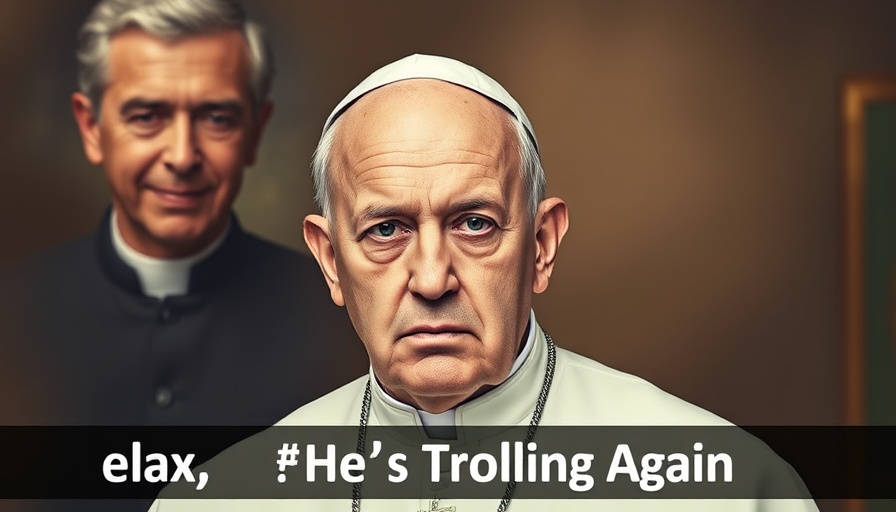
Why the Media Misses the Point on Trump’s Jokes
In a world where the landscape of American politics evolves daily, the media's reactions to President Donald Trump's comments often seem out of touch. The media consistently struggles to differentiate between satire and serious intent, as exemplified by Trump's recent joke about contemplating a run for the papacy—an idea that most of his supporters likely recognize as a playful jab rather than a legitimate ambition. This tendency leaves the media ensnared in a cycle of misconstrued headlines, sensationalism, and a failure to grasp the nuanced humor that often characterizes Trump’s statements.
In 'How Trump’s Pope Meme Broke the Media,' the discussion dives into the implications of humorous political commentary, exploring key insights that sparked deeper analysis on our end.
Understanding the Intent Behind Trump’s Statements
Trump's penchant for trolling the media has become a characteristic part of his brand. Instead of treating his outlandish comments as merely humorous, they often act as fodder for further political contention. A recent example was when he shared an AI image of himself as a potential Pope candidate. The media reacted with outrage, accusing him of undermining respect for religion. However, to conservatives, this was yet another instance of humor playing a role in the political arena, an arena where everyone should be able to engage without being met with disproportionate backlash.
The Media's Self-Inflicted Narrative
The echo chamber effect within major media outlets often leads to a distorted representation of Trump's remarks. Accusations of Trump posing as a would-be dictator or a potential candidate for an unconstitutional third term fail to acknowledge the obvious facetiousness in his comments. This consistent misinterpretation serves a bigger narrative: portraying Trump as a substantial threat to democracy. Yet, as his recent interview on Meet the Press revealed, Trump himself affirmed that the question about running again in 2028 was more about strategic positioning than a definitive desire to proceed with a candidacy.
Crossing Lines: Cultural and Social Consequences
The reaction from the media often spills over into cultural commentary. By feigning offense on behalf of groups like Catholics, the media distracts from serious discussions about the political landscape. When they try to hold Trump accountable for perceived blasphemies, they neglect their own political transgressions—such as the criticism of pro-life advocates or religious freedoms, painting a picture that seems hypocritical.
Opportunity for Engagement and Connection
Instead of getting caught up in outrage, this moment can be utilized as a launchpad for real conversations about the relevance of humor in politics. Conservative values centered around family and community need to engage with younger voters and explain how the current political climate affects their lives. Instead of simply defending Trump or condemning his tactics, conservatives can use these jokes as opportunities to connect on shared values like love, family, and freedom—words that resonate deeply within the conservative ethos.
Misperceptions and Unpacking Humor in Politics
Many often misconceive Trump's style as abrasive; however, in the political world, humor plays a critical role in easing tension. Engaging with smears and satire provides an alternative lens through which to view contentious topics. Humor can actually serve to disarm criticism and allow for a more relatable connection to political ideologies—one that isn’t always cloudy with tension.
The Future: Predictions and Trends in Political Satire
As we observe an era where conversation and debate are increasingly polarized, the way Trump and his supporters utilize humor may become crucial in shaping the political narrative going forward. Will future candidates follow suit and adopt a more humorous tone to engage with constituents? Will they find ways to contrast their vision of America with the tension-laden debates that often dominate media coverage? Understanding these dynamics will be essential in navigating an increasingly complex political environment.
Conclusion: Embracing the Humor in Politics
As we reflect on the humorous jabs from President Trump, it's crucial to consider the broader implications of how humor can shift political dialogue. The aim should always be to foster a more engaged electorate that values conversation over conflict. By encouraging a culture where humor and politics coexist, conservatives can reaffirm their stance while appealing to a wider audience. Remember, laughing amid the chaos can be one of the best responses to political discourse, and a shared chuckle can often dissolve barriers more effectively than serious debate.
 Add Row
Add Row  Add
Add 




Write A Comment